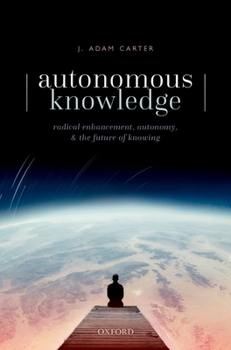Autonomous Knowledge: Radical Enhancement, Autonomy, and the Future of Knowing
A central conclusion developed and defended throughout the book is that epistemic autonomy is necessary for knowledge (both knowledge-that and knowledge-how) and in ways that epistemologists have not yet fully appreciated. The book is divided into five chapters. Chapter 1 motivates (using a series of twists on Lehrer's TrueTemp case) the claim that propositional knowledge requires autonomous belief. Chapters 2 and 3 flesh out this proposal in two...
Format:Hardcover
Language:English
ISBN:0192846922
ISBN13:9780192846921
Release Date:May 2022
Publisher:Oxford University Press
Length:176 Pages
Weight:0.70 lbs.
Dimensions:0.7" x 5.6" x 8.4"
Related Subjects
PhilosophyCustomer Reviews
0 rating





